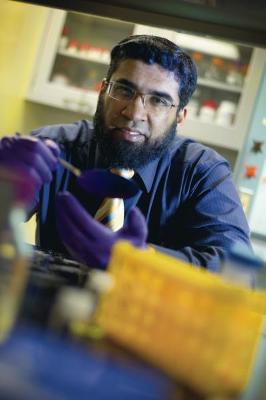Jun 25 2014
A multi-institutional research team has received a $480,000 National Science Foundation grant to build an inexpensive device that uses nanotechnology and a simple urine test to detect the most miniscule amount of bladder cancer cells in a patient.
 Samir Iqbal, associate professor of electrical engineering, has received a National Science Foundation grant to build a device that would detect bladder cancer earlier. Credit: UT Arlington
Samir Iqbal, associate professor of electrical engineering, has received a National Science Foundation grant to build a device that would detect bladder cancer earlier. Credit: UT Arlington
UT Arlington's Samir Iqbal, an electrical engineering associate professor, has teamed with Young-tae Kim, an associate professor in bioengineering; and Yair Lotan, who is a chaired professor in urology at UT Southwestern Medical Center, to publish their findings in an upcoming issue of Analytical Methods.
"This is the least invasive way to detect bladder cancer," Iqbal said. "There's no MRI. No blood being drawn. It's just a urine test. Our device and method can detect as few as two bladder cancer cells in a full liter of urine. That's the kind of sensitivity we will achieve."
Early detection is considered a key to treating cancer effectively. Bladder cancer is frequently asymptomatic and as many as 25 percent of patients are diagnosed at an advanced and often incurable stage. The American Cancer Society estimates that nearly 75,000 bladder cancer cases will be diagnosed, while nearly 16,000 people in the United States will die from bladder cancer this year. And these numbers are much more overwhelming for the rest of the world.
The National Cancer Institute estimates the five-year survival rate is 98 percent for Stage 1 bladder cancer but that falls off to only 15 percent five-year survival rate for Stage 4.
Cancer detection typically involves drawing blood from a patient, or taking a biopsy of the tissue with thick needles. The samples are then sent away to a lab for screening if cancer cells are there. Results can take days or weeks.
Iqbal said his team's device would eliminate the need for a blood draw for every test. Patients could test their urine at home, and then transmit the results to their doctor over the Internet. The device could cost as little as $100 per unit, he said.
"At that price, nearly anyone who needs to monitor their cancer or recurrence of cancer could afford it and could afford to do it at home," Iqbal said.
Once scientists and laboratory technicians who analyze the test results capture the patient's download, they'll be able to see whether cancer cells are present. Physicians then could fine-tune treatment for their patients.
"We see many types of cancer cells start dancing when you see them running across the rough nano-material chip surface. That's the way you can tell they're bad cells," Iqbal said. "Regular cells don't dance."
Khosrow Behbehani, dean of the UT Arlington College of Engineering, said the project is a testament to the power of collaboration.
"Dr. Iqbal and Dr. Kim will bring in the instrumentation and bioengineering expertise and Dr. Lotan the medical knowledge to the project," Behbehani said. " Our own faculty and our research partners at UT Southwestern integrate the cutting edge technology and medicine for this ground-breaking research. It is the type of teamwork needed to achieve such a significant goal."
Source: http://www.uta.edu/